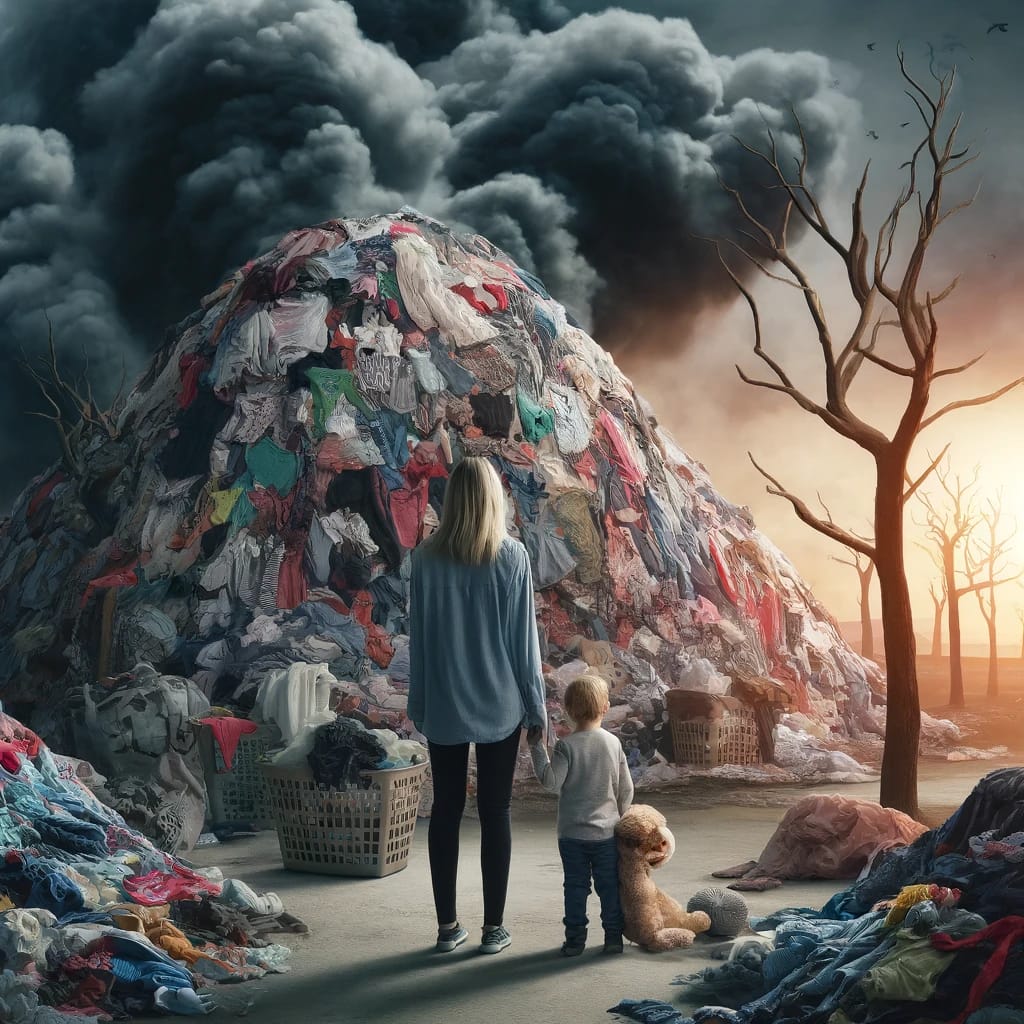
Fast Fashion vs Sustainability: GreenEcoBaby's Challenge for a Sustainable Future
The fashion industry, and fast fashion in particular, is among the main culprits of global pollution. The children's clothing sector also contributes greatly to this problem, with clothes that are worn for very short periods due to the rapid growth of the little ones, and then often thrown away. GreenEcoBaby presents itself as a sustainable alternative, pushing towards reuse, recycling and making children responsible for their choices, with important environmental and psychological benefits.
The Numbers Behind Fast Fashion: A Devastating Impact
Fast fashion has transformed the way we buy clothes, increasing consumption and reducing the life cycle of garments. The data is alarming:
The fashion sector produces 10% of global CO2 emissions, more than the entire aviation and shipping industries combined (UNEP, 2019).
An impressive amount of water resources is used: approximately 79 billion cubic meters of water per year.
Every year, 92 million tons of textile waste are generated. This means that, on average, a person in Europe or the United States throws away about 30 kg of clothing per year, much of which is not recycled or reused (Ellen MacArthur Foundation, 2017).
Children's clothing represents a significant portion of this waste, as it is quickly replaced due to the rapid growth of children. However, through reuse and recycling, we can drastically reduce this environmental impact, conserving precious resources and limiting pollution.
The Psychological Role of Reuse: Reducing Anxiety and Increasing Self-Esteem
The impact of fast fashion is not only environmental: its effects are also reflected in the mental health of children. Often, the obsession with appearance and the possession of new and trendy clothes can fuel insecurities and anxiety in the little ones. A study by the Journal of Consumer Research highlighted that children exposed to excessive materialism tend to develop lower self-esteem and greater anxiety.
When we teach children not to depend on the "new" at all costs, we free them from this pressure. Reusing and recycling clothes promote a more balanced view of consumption and help children focus on what is truly important: who they are, and not what they wear. This approach improves their self-esteem and makes them more confident.
Not being perfect means feeling like you are enough.
Freeing yourself from the idea that you always have to be perfect and fashionable helps children grow up more serene. A study published in Psychological Science has shown that children who are less exposed to materialistic pressures develop better mental health, with a more positive attitude towards life and social relationships.
Empowering Children Through Informed Choice
One of the main goals of our Eco-Movement is to empower children in their choices. Through the platform, parents can buy or receive vouchers in exchange for old clothes, allowing their children to actively participate in the choice process.
How does it work?
1. Make a list of what you need: Involve children in making a list of the things they really need. This helps them develop a conscious approach to consumption.
2. Use filters for categories and sizes: Thanks to the filters available on the site, children can select clothes that match their needs and size, choosing only what they really like.
3. Freedom of Choice: Giving children the freedom to choose their clothes according to their personal taste makes them more confident and satisfied with their decisions.
A study conducted by the University of Toledo has shown that children who actively participate in family decisions develop a greater sense of responsibility and creativity. In this way, they learn to balance their desires with real needs, growing up more aware and autonomous.
A Childhood Free from Extreme Materialism
Teaching children the value of reuse and simplicity helps them grow up with less attachment to consumerism and a more focused attention on people and experiences, rather than objects. This type of education helps them grow up more empathetic, creative and self-confident.
Studies like the one published in Psychological Science show that children who are less influenced by materialism develop better emotional and social skills. Living without the constant pressure of having to appear perfect or always have the best helps them to be more carefree and enjoy childhood for what it really is: a time of growth and discovery.
Conclusion: Towards a Sustainable and Conscious Parenting
The GreenEcoBaby Eco-Movement not only reduces the impact of fast fashion on the planet, but offers a new educational perspective for our children. By teaching the value of reuse, simplicity and freedom of choice, we can raise happier, more confident and aware children.
🌱 Join the change!